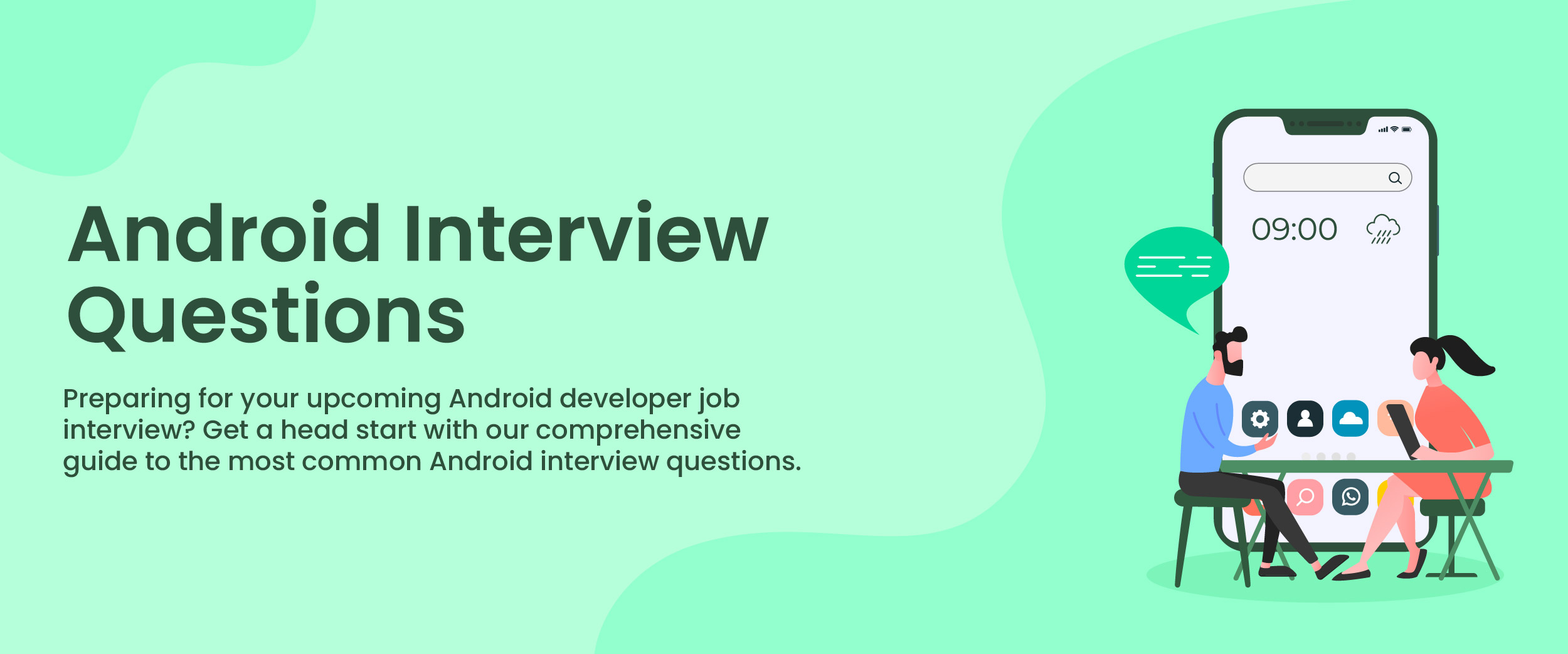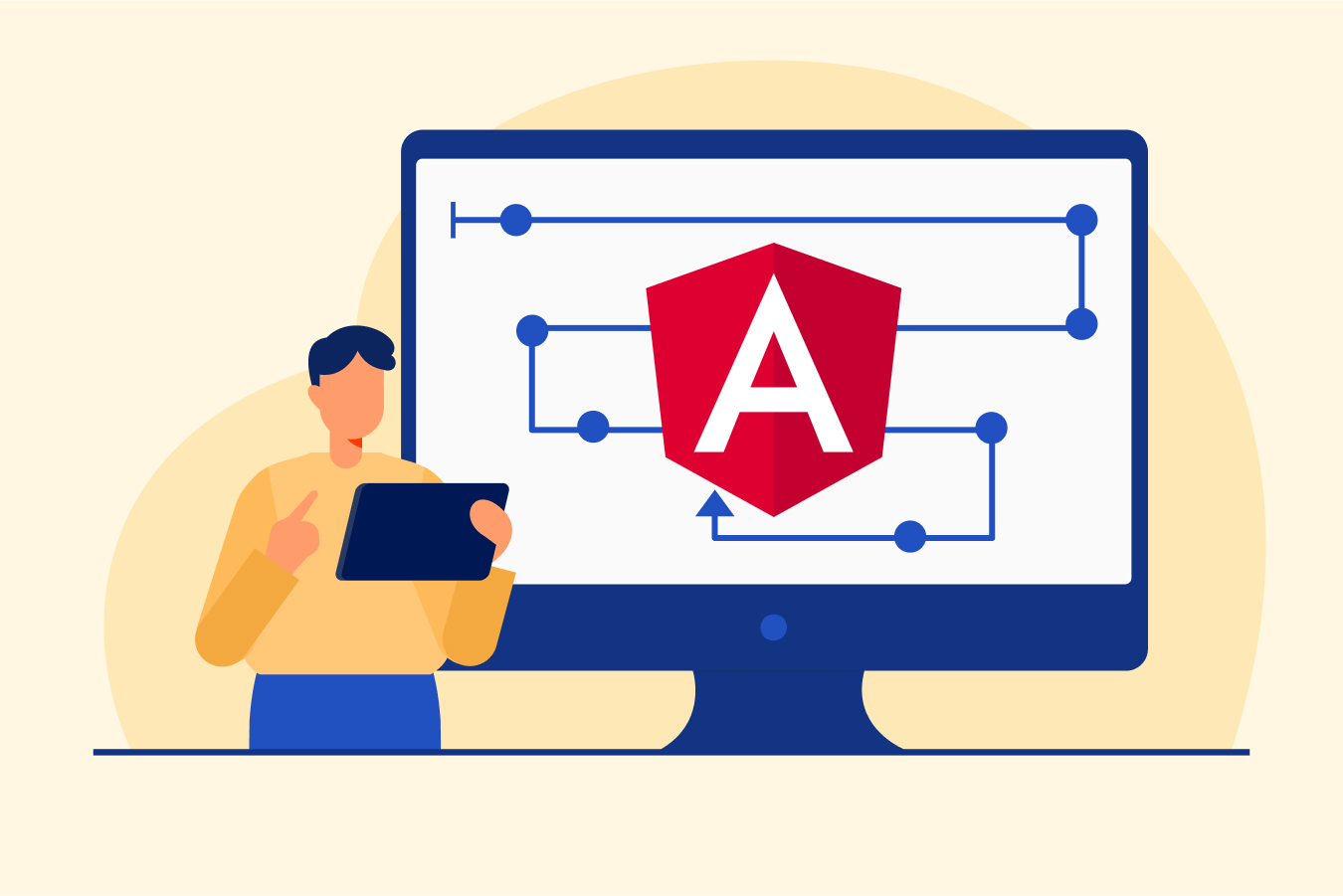Android Interview Questions
Android is an open-sourced, Linux-based mobile operating system provided by Google LLC. It is flexible in the sense that it allows its users to perform both advanced and basic functions. It also allows the users to customize the settings as per their liking which makes it more user-friendly than other operating systems like iOS.
Android is platform-independent and succeeds in supporting various technologies like speech, BlueTooth, Wifi, EDGE, etc. Considering its features and its functions and also not forgetting its wide usage all over the world, Android has a growing scope.
Cracking the interview of android could be tough taking into consideration the number of applicants for the jobs and their growing popularity. There are many Android development courses that you can do to increase your chances of getting a job in this field. In this blog, we will discuss various android interview questions and answers for both freshers and experienced people.
Android Interview Questions for Freshers
Android interview questions for freshers are easy to crack if you have the right understanding of the system. When a fresher is interviewed for any job, they are not expected to know everything about the company or the job that they are applying for. Therefore the interviewers stick to basic questions.
Let us see what type of questions can be asked of freshers and how the candidates can answer those questions.
1. What is your understanding of Android?
Android is an open-source operating system primarily designed for mobile devices such as smartphones, tablets, and smartwatches. It is based on the Linux kernel and uses a modified version of Java programming.
2. What are the various components of Android?
Various components of Android are:
- Service providers
- Receivers of broadcasts
- Providers of content
3. Do you think Android is limited?
Android has its limitations such as its hardware quality being mixed, it has many ads in apps, it has bloatware, and many more.
4. What all languages is Android built on?
Android is built on various languages like Java, Kotlin, C#, Python, C++ programming, and many more.
5. Define Activity in Android
The activity represents the Graphical User Interface in Java’s single screen. This helps the users dial a phone number, view their inboxes, etc.
6. What is Service?
Service is an application that continues to run in the background without any interaction from the user’s side. This is what keeps the apps running in the background even when the user switches from one application to the other.
7. What is your understanding of Google Android SDK?
Google Android SDK writes applications on devices that are android-enabled by the developers.
There are many tools in the Android SDK like Android Emulator, DDMS, ADB, and AAPT.
8. What do you think a Bundle is in terms of Android?
A bundle is used to pass the data in between the Android activities that are there in an application. The data can be passed to another activity by using a key.
9. Explain what an Adaptor is.
An adapter bridges the gap between the underlying data and the AdapterView which sends the data to the view to be shown on various views like a spinner, grid view, etc.
10. What kind of database is used in Android?
The database used in Android is an open-source, lightweight, and relational database used for all mobile applications.
11. Define AAPT.
Android Asset Packaging Tool (AAPT) allows the developers to create archives that are ZIP-compatible.
12. Where are layouts placed in Android?
Layouts in Android are placed in the layout folder of the application. The structure of the user interface (UI) in an app is defined by the layout.
Android Interview Questions For Intermediates-
The following are some Android interview questions for intermediates:
13. What is the scope of Android?
The scope of Android is vast and constantly expanding. It has an impact on various fields like communication, entertainment, and enterprises.
14. What are the various pros of Android?
Android pros are:
- It is open-source
- It’s platform-independent
- It is highly optimized
- It is available on all apps and technologies.
15. What are the various cons of Android?
Android has to streamline issues, poor data connection in some places, and many more.
16. What are the features of Android Architecture?
There are many features of Android architecture like Linux Kernel, Libraries, Android runtime, Android framework, and applications.
17. List the languages that are used in Android.
There are different types of languages used in Android like Java, Kotlin, C#, Python, C, C++, Lua, and more.
18. How will you differentiate Activities from Services?
Activities are designed to run in the foreground whereas Services are designed to run in the background.
19. What are the tools in Android SDK?
There are various tools in the Android SDK which are Android Emulator, Dalvik Debug Monitor Server (DDMS), Android Debug Bridge(ADB), and Android Asset Packaging Tool (AAPT).
20. How will you explain the lifecycle of Android activity?
The full circle of the activity in Android starts from:
- OnCreate- When an activity is first created.
- OnStart- when the activity is visible to the user.,
- OnResume- When an activity starts to interact with the user.
- OnPause- when the activity is in the background and is still running.
- OnStop- when the activity isn’t visible to the user.
- OnDestroy- when the activity is finished and needs to be ended.
- OnRestart- When the activity has stopped and before the OnStart.
21. What is a fragment?
A fragment can be defined as a part of an Activity in Android that can be displayed on multiple screens on one activity.
22. What do you mean by NDK?
NDK stands for- Native Development Kit which helps with the development of a part of an app using C++ to give better performance.
23. What are Sensors in Android?
Android sensors are used to monitor three-dimensional device changes in the environment of the device. There are various types of sensors in Android like motion sensors, environment sensors, and position sensors.
24. What dialog boxes does Android support?
Various dialog boxes are supported by Android such as AlertDialog, DatePickerDialog, TimePickerDialog, and ProgressDialog.
Android Interview Questions for Experienced
The questions discussed above were only for freshers. If you are experienced in the field of Android, have the proper experience, and are applying for a job, you will be expected to know all the basics.
So, now that we know many Android interview questions for freshers, let’s go on to see what can be Android interview questions for those who are experienced.
25. Elaborate on broadcast receivers.
The broadcast receiver mechanism is used by the host application where every message such as SMS notifications, incoming calls, etc. is an internet object and is broadcasted in the same manner to the receiver.
26. In an Android application, what are the important files and folders?
The files and folders in Android applications are:
- Gen- This has the R-generated files
- Src- This has the Java source file.
- Bin- It has the APK files.
27. What do you think is the best approach for Android?
Data needs to be transferred from one activity to another when applications are being developed. To support this transfer of data, additional actions are required and the object should neither be serializable nor parseable.
28. What database does Android use?
The open-source relational database used in Android is SQLite whose engine is serverless and self-contained. Here you can elaborate more on SQLite and what advantages it has and the role it plays as Android’s database.
29. What is a Content Provider?
Content Provider, a standard interface, is a subclass of ContentProviderclass used to store the data and provide solutions for data security. It also forms the base of Android applications that manage the developer’s access to data.
30. What according to you is a Portable Wi-Fi hotspot?
With the help of a Portable WiFi hotspot, you can use your device’s data as a wifi connection and let other wireless devices connect to it to share your internet.
31. Explain Android Debug Bridge(ADB):
With the help of an emulator instance, this command-line tool can control communication and is also used to run many applications on the emulator.
32. Explain what DDMS is.
Dalvik Debug Monitor Server is a simple debugging tool that gives various debugging features like Thread and heap information, Logcat, Screen capture on the device, Network traffic tracking, and more.
33. How will you define AIDL?
Android Interface Definition Language is used for communication between the client and the service for IPC. it takes care of all the interface requirements. The AIDL data types include List, Map, String, etc.
34. What is an AndroidManifest.xml file?
This file consists of information about the applications that should be known to the Android system before any of the codes can be executed.
Basic Android Interview Questions
Some of the basic android interview questions are:
35. What is intent?
Intent helps facilitate communication in many ways between different types of components. It helps launch broadcast receivers, dial a phone call, and many more things.
36. Differentiate between class, file, and activity in Android.
- File- It is used on the filesystem.
- Class- It is used in a Java Class
- Activity- It is a particular java class that is used in Android.
37. What do you mean by Toast?
A toast can be defined as a small popup notification that provides the user with a small notification and fills up only a little bit of space.
38. What is a Toast’s syntax?
The syntax would be the rules around which the Java program has to be written. The same has to be applied to write a Toast in Android.
39. Explain Context.
A context can be defined as being the handle to a system that provides many services some of which are:
- Resolving resources.
- Getting access to the database.
- Getting access to preferences, and many more.
40. What do you mean by Implicit and Explicit content?
Explicit content would mean something that is very specific and clear in the content and it has no ambiguity or vagueness in the content. Implicit content on the other hand would refer to content that does not have everything defined clearly or directly.
41. What measures would you take to steer clear of ANR?
The following can help you steer clear of ANR:
- HealthStats
- Debug
- ApplicationExitInfo
- Strict mode
42. What would you do if an application is crashing?
You will first have to see if any bugs in the application are causing the hindrance and then reset the application setting to make sure they are running smoothly.
43. What are the different launch modes?
The different launch modes are:
- Standard
- Single Top
- Single Task
- Single Instance
44. What do you mean by containers?
Containers help hold various widgets and objects together in a particular fashion or order to keep them all organized. They can hold anything like labels, fields, etc.
45. What do you mean by Dalvik?
Dalvik can be defined as a discontinued process virtual machine, in short (VM) that helps with the execution of the applications written in Android.
46. What is the most recent Android version?
As of now, Android 12 is the twelfth release of the Android version and was released on May 18, 2021. It was developed by the Open Handset Alliance led by Google.
47. How will you create a new Android application?
The following steps have to be followed to create a new Android application:
- Install Android Studio.
- Tap on New Project.
- Write the welcome message.
- Add the main activity.
- Create the second activity.
- Put in use the “onClick” method.
- Test the application.
Conclusion
The Android interview questions you can be asked during the interview will mostly depend on the interviewer. The interview can be either non-technical or technical or both. These questions will be your guide to ace your Android interviews whether they are technical or non-technical.






